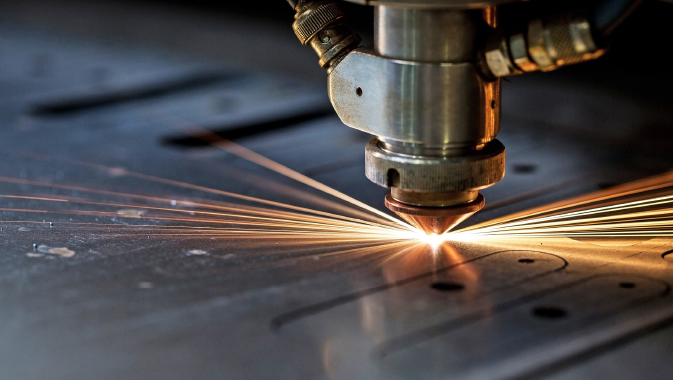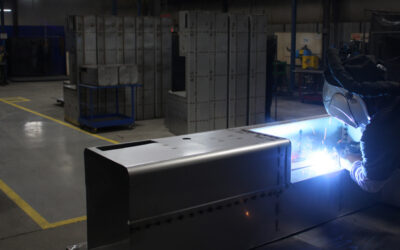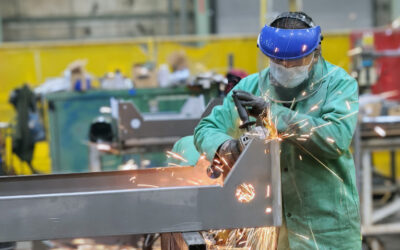Duggan Manufacturing is a producer of custom parts for many varied industries operating out of Shelby Township, Michigan. Over nearly two decades the company has developed the necessary expertise to help customers take a project from its earliest design into the prototype phase, and deliver a product that meets the highest quality standards.
~
Established in 2000, Duggan began as a manufacturer of auto parts, but after eighteen years the company has expanded to serve many industries beyond automotive including defense, aerospace, agriculture, home appliance, construction, alternative energy, and more. From within a single 72,000 square foot plant attached to a 28,000 square foot facility, the company does a surprising amount with the space it has. With a significant focus on metal parts, Duggan has the capacity for many fabrication processes including stamping, machining, cutting, bending, and a variety of weld technologies for assembly.
Beyond sheet metal, the company also has equipment in-house to perform plastic injection molding and pipe and tube forming. The sheer range of process technologies offered under a single roof is an important part of what makes Duggan Manufacturing a stand-out company.
Once a prototype has been built, Duggan’s commitment to quality can be seen in that prototype’s journey from the manufacturing floor to final delivery. The company has invested substantially in on-site inspection technologies to ensure that the highest standards of product quality are maintained, and a number of quality certifications have been awarded to back that up. Providing all of these services in-house has given Duggan a significant advantage over competitors, and the company has been very successful as a result. From humble beginnings as a small startup in 2000, Duggan is on track to earn fifteen million dollars in revenue in 2018.
Stamping is a fabrication process for modifying sheet metal using a hydraulic press. A piece of sheet metal, called a blank, is fed into a stamping press where two components that fit one inside the other, known as a tool and die, are hydraulically pressed against it from the top and bottom. They press with enough force to reshape the blank into the final part. Within Duggan’s facility the company has more than 60 of these machines ranging from 50 to 1200 tons of hydraulic force. Some of these machines can form parts up to roughly seven square feet. Deep drawing is a type of metal stamping where the final form of a part is deeper than it is wide. This process requires a particular expertise and Duggan Manufacturing considers it a specialty.
Hot stamping is a process used for the production of parts that require high yield and tensile strength properties, and can be used to form high strength steel that can’t be formed with traditional stamping processes. Duggan uses a proprietary alloy that is high in boron. It is pressed in the stamp at 2000 degrees Fahrenheit, and the tensile and yield strength can up to double after processing. The resulting product is useful in lightweighting as much thinner parts can be much stronger. These various forms of sheet metal stamping for prototype production is no small part of the work that Duggan Manufacturing does, but the full suite of services offered by the company goes much further.
Machining is a subtractive manufacturing process where a metal blank is cut into a desired shape by milling or grinding away material. Duggan has sixteen manual machines, and sixteen CNC (Computer numerical control) machines. The manual machines are operated directly by machinists who can manually add features to a metal part. In many cases this is much faster and less expensive than using the more advanced equipment. A CNC machine is a piece of machining equipment where the milling bit is controlled by computer software. The software can be given complex geometries in the form of three dimensional models, and the equipment can run many copies of the same model with a high level of accuracy and consistency. Having access to this equipment enables Duggan to create its own dies and tooling for other processes in-house. This gives the team a high degree of flexibility for rapidly modifying and adjusting parts, a very advantageous capability for a prototyping company.
The company is also capable of performing a wide range of welding processes including MIG and TIG, resistance, riveting, staking, toxing, nut, and laser welding. Duggan has a number of professional welding experts on staff who are all specially certified to work on the projects they’re assigned to. The high level of expertise present in the Duggan workforce is complemented by the cutting edge quality of the equipment they use. Beyond more than a dozen pieces of manual welding machinery, Duggan has a line of 10 welding robots using MIG and laser processes. The laser welding equipment can operate at high speeds with near perfect accuracy, resulting in cost savings for Duggan customers.
Duggan Manufacturing also employs high end laser equipment for cutting. The company understands the value of staying at the forefront of available technology, and it is continually investing in upgrading its equipment line up. In 2010, Duggan purchased its first fiber optic laser cutter. This new piece of equipment was so efficient that it took over the work of five CO2 laser cutting machines, enabling the company to sell those and bring in more fiber optic systems. The advantages of these over the older CO2 machines are significant: they are much more reliable, reducing the need for maintenance; they use substantially less electricity, reducing operating costs; they run much faster; and the process is repeatable, with consistent results.
Following the fabrication of a component, it is put through a thorough inspection process. Duggan uses a coordinate measuring machine (CMM) to measure the precise geometry of a part to ensure that it has been accurately manufactured within the required tolerances. While this process is the most accurate way to measure geometry, there are circumstances where a CMM is not viable. In these cases, blue light scanning can be used instead. This is a three dimensional scanning process that casts a blue light on the part and uses multiple camera angles to triangulate the position of specific points on its surface. By collecting the positions of these points, the part can be reconstructed digitally, where it can then be inspected.
Duggan also has an A2LA certified Metallurgical laboratory. The A2LA is the American Association for Laboratory Accreditation, and they have certified Duggan’s lab as meeting the necessary standards to analyze some of the metallurgical properties of the products that the company manufactures. This commitment to high quality is a driving principle at Duggan Manufacturing, and one that keeps customers coming back time and again for the services it offers. Upwards of 75 percent of the work the company does is for returning customers whose expectations were exceeded the first time around.
With nearly two decades of experience manufacturing parts for such a broad range of industries, Duggan Manufacturing has developed a level of expertise, and a collection of capital equipment, unmatched by its competitors. Focused on continually investing in itself, the company maintains this edge by staying on top of developments in the industry, in order to provide the best value to customers in terms of speed, efficiency, and cost.













